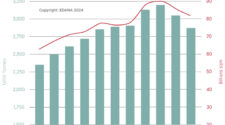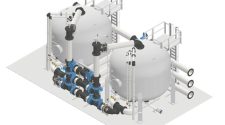The filtration industry is changing and standing still is not an option. Business owners must choose between several financial paths, including investment in growth, M&A activity and cashing in.
As the world is hopefully emerging from the throes of the COVID-19 pandemic, the filtration industry is front and center.
This is the perfect time for business owners to make a decision, about their future and the future of their company. The marketplace is expanding, becoming more complex and facing significant changes that will create both challenges and opportunities. For example, in response to COVID-19, the industry has provided key materials for protecting consumers via, for example, particle filtration and personal protective equipment. In order to meet demand, business owners are incurring additional costs associated with reengineering equipment, and the large increase in the cost of polypropylene resin, averaging 34.2% higher in North America, than it was last year.1
Another example is in the residential housing market that is projected to grow by approximately 22.5% this year. The increasing demand for higher levels of filtration in these homes will have a direct impact on our industry.2
Brands and manufacturers will continue to seek vendors who can handle their growing supply chain requirements, as well as make investments in R&D, new equipment, more integrated information technology and other capabilities. You may need to ask yourself if these are capabilities you have internally, and if not, how and where you will acquire the skills, experience and competencies.
Many executives and stakeholders are wondering what strategic direction is best for them. They can choose to continue to grow organically, or through acquisitions, finding partners or additional funding. Conversely, if their company’s value is high, or the owners do not want to make the investments necessary to be competitive, it may be a good time to exit.
As a rule of thumb, your own process should begin with a true evaluation of your situation, both business and personal; a discussion with your management team; and a brainstorming session with an investment banker who is experienced in guiding your type of business through strategic alternatives.
The investment banker should understand your role in your industry, as well as the needs of businesses of your size. The banker’s role is like that of a “strategic coach,” who can help you start the process and navigate the intricacies of transactions; they know how to sell and buy companies, how to get the most value from a transaction and how to leverage your assets in different ways—from a partial sale to a strategic alliance to raising capital.
Selling your company, or buying someone else’s, is not a task you want to take on without the assistance of experts that understand the steps, can navigate the process and bring value to whichever side of the table you end up on.
Do I grow?
Once you have made the decision to invest in the company in order to keep up with demand, the next question is: How can I grow my business organically or do I need to add external assets to keep moving forward? Here are some of the basic strategies:
- Partner: Seek a strategic partnership to propel growth with expanded resources and/or capabilities.
- Secure growth capital: There are several sources of growth capital available. Selecting the right one for your business depends on your situation. Three of the most popular methods are:
- o bank debt via a commercial loan at favorable market rates and terms;
- o mezzanine financing through an unsecured loan that typically commands higher interest rates than a bank loan, but has no principal amortization, providing better liquidity; and
- o equity investment, in which an individual or firm exchanges cash for ownership in your company with the anticipation of sharing in the income and growth.
- Acquisition: You should only choose to acquire another company that will be accretive to the value of your business. You can start by developing a checklist of criteria that the acquisition should provide. Some key areas for consideration are adding product lines, distribution channels, capacity, capabilities or geography. Always consider the impact of additional customers.
- Organic growth: Create new ways to increase revenue by using your existing resources more effectively.
I take money off the table?
There are several options that exist to take money off the table. You can do a recapitalization or “recap” of the business that will reorganize the balance sheet and allow the owner to get money out of the business while maintaining control. You can also sell all or part of the business. There are several types of buyers who have different advantages and attributes that can be considered:
- Strategic buyer: A strategic buyer often pays the highest price and has significant synergistic reasons for executing on a transaction. Your company’s capabilities could increase the strategic buyer’s scope in ways you may never imagine, substantially increasing their own value and paying you a lucrative multiple. In today’s market, foreign strategic buyers are paying above market prices for companies as a way to get into the U.S. market.
- Private equity: There are also a large number of private equity firms who are active in filtration-related industries. If your transaction is structured correctly, these firms will purchase a portion of your company (some majority, some minority), allow you to take money off the table, stay involved and share in the growth. This is an appropriate hedging strategy for those who are not quite ready to exit and want to hedge their bets.
What is my business worth?
In any of the above scenarios, your investment banker should be able to help you understand the value of your business. Be very careful about the industry rule of thumb: The specifics of your business really impact its value. It’s important for you to understand the value that an investor sees in your company. If the purchaser is strategic, then you need to know how your business will impact the value of their business to obtain the highest valuation. Do not assume that an industry average multiple is the right valuation metric for your business.
This is the first part in a series of articles on best practices for mergers and acquisitions in filtration-related industries. The next edition of this series will focus on 12 critical steps for selling a business.
References
1. INDA’s Nonwoven Markets Price Trends Summary, 1/2021: “Polypropylene Resin is averaging 34.2% higher in North America than last year. This is significant when PP Resin was ~68% of total global resin consumption in 2018.”
2. In the residential housing market, according to U.S. DOC, privately owned housing units authorized by building permits in 1/2021 were at an adjusted annual rate of 1,881,000 or 22.5% (±1.8%) above the 1/2020 rate of 1,536,000.












